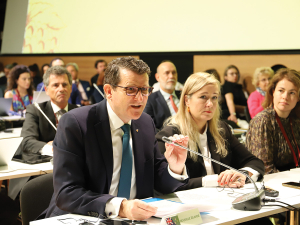The newly elected Director General of the Organisation of Vine and Wine takes up his role on 1 January 2024, 100 years after the organisation began. We ask Dr John Barker about a career that has married his love of law and of wine, and about the significance of having a New Zealander at the helm of the OIV.
What was your first memorable wine experience?
My father was a wine lover and often took the kids along with him when he visited the vineyards in Henderson and Kumeu to buy wine. So I have memories of the likes of Collards and Lincoln Vineyards on Lincoln Road from long before I was of an age to drink wine. But I think the first real “wow” wine I tried was a vintage Veuve Clicquot champagne that my parents had been given. I can’t remember the taste but it was one of those wines that instantly makes you break into a smile.
Did working in a wine shop while studying for law influence your career?
Yes certainly. I got my first job in a wine shop at the same time as I started university. That was in 1987, which was a very exciting and dynamic time for the New Zealand wine industry and it really caught my interest. So law and wine were always side by side and I feel very lucky that I was able to build a career that combined the two interests.
What led you to choose your research topic for your PhD - ‘Different Worlds: Law and the Changing Geographies of Wine in France and New Zealand’?
I had been working as a wine lawyer in Melbourne when I got a call out of the blue asking if I would be interested in joining a research project on the wine sector that was being put together by geography Professor Warren Moran at the University of Auckland. They were looking for someone to do a PhD in wine regulation as a part of the project. Although it meant putting my legal career on hold, I made the decision to come back to New Zealand to take up the offer because the interface of law and the wine industry was a subject that had a deep interest for me. I was really fascinated to understand the way that law shapes the industry and how and why it differs in different places.
Being part of a bigger research project based in the social sciences and in practical field work taught me a great deal. We spent months driving around the country interviewing pioneering growers and winemakers. Then I went to France to do research in Burgundy and to interview industry and regulators there. These experiences allowed me to look beyond the narrow problem-focused perspective of a lawyer to understand the wider complexities of the industry. It was also during my research that I visited the OIV for the first time - so clearly that was an influence!
How have you advocated for the wine sector?
I have been lucky to be involved with New Zealand wine at a time when the industry has emerged from a small and internally focused producer to becoming the world’s sixth largest wine exporter by value. Having the right legal framework in place has been a part of that. While at New Zealand Winegrowers (as General Counsel and General Manager Advocacy from 2004 to 2014) I led the implementation of the Wine Act 2003 and the Geographical Indications (Wine and Spirits) Registration Act 2006, which are the two most important pieces of legislation for our sector.
For me it was just as important to make sure that the law was accessible and understandable to wineries. When the Wine Act was coming into force, I advocated for an industry-led Wine Standards Management Plan Code of Practice. At the time, this was the first industry-led code of this nature, but it is now standard practice across the food sector. The International Winemaking Practices Guide and Labelling Guide were also my babies – although they have come a long way from the few pages of the original versions.
In the OIV, the task has always been to facilitate innovation and trade while protecting the integrity of wine. This can sometimes be a delicate balance. For example in 2012, together with Professor Monika Christmann of Germany, I presided over the often- difficult discussions that allowed for de-alcoholised and partially de-alcoholised wine to be recognised in the OIV. These categories are now finally being introduced into EU law based on the OIV recommendations.
What does your election as Director General symbolise for New Zealand?
It is a very clear acknowledgement of the respect and credibility that the New Zealand wine sector has built up over the years. I was elected with more than 97% of the eligible vote and I will be the first person from outside of the three biggest wine countries – France, Italy and Spain – to hold this position in 100 years of the OIV’s existence. That sort of worldwide support would not be possible if the OIV member countries did not recognise New Zealand as a serious player with an important stake in the global wine sector.
And what does it mean for the global organisation, based in the heart of old world wine?
The election sends a strong message that the OIV is a global organisation serving a global sector. For me, the characterisation of old world and new world is not very helpful. Fundamentally I believe that wine countries have far more in common than they have differences – especially today when we all face global challenges like climate change.
Having said that, coming from a comparatively young and small Southern hemisphere wine country I am sure that I will bring a new perspective to the OIV. The New Zealand wine industry has always aimed high and it has chosen to take a leadership role on issues like sustainability. The New Zealand wine industry has been successful in no small part because it has been able to recognise where its common interests lie and to coordinate around those interests. Ambition, integrity, cooperation, kaitiakitanga – these are all New Zealand values that I will take with me into the role.
What are the key roles of the OIV?
The OIV is sometimes called the ‘UN of wine’. It brings together governments and experts from most of the major producers and consumers of wine (and other products of the vine) to analyse and make recommendations on all scientific and technical aspects of the sector.
The OIV makes recommendations about viticulture, winemaking practices, labelling and definitions, health and safety that are taken up in the laws and regulations of many countries. It also works together with other international organisations that make rules and recommendations affecting wine. So it is extremely important for the global production and trading environment for wine.
The OIV also publishes information, guidance and statistics that are vital for our understanding of the vine and wine sector. For example, every year the OIV gathers and publishes the authoritative data on how much wine is produced, traded and consumed around the world.
And what do you see as the most pressing challenges for wine producers around the world?
Over the course of my campaign I have visited many of the OIV member countries and spoken to both government and industry about the challenges that they are facing. Consistently the greatest areas of concern for the sector in the long-term are climate change and sustainability, and questions around wine, health and society. The sector is also grappling with the implications of artificial intelligence and the digital economy. These are all areas where the OIV can make a difference by providing evidence-based recommendations and guidance to its members and the sector. One of the key elements of my election platform was for the OIV to take a stronger leadership position on these topics.
How much support did you receive from within and beyond the wine sector in the lead up to your election?
Running a campaign to head an international intergovernmental organisation is a massive job. I was very lucky to have an incredible campaign team behind me. New Zealand Winegrowers provided financial and strategic support, for which I am extremely grateful. Since the OIV is a government organisation, it is necessary to persuade the governments of the member countries to vote. The New Zealand Government – particularly through the Ministry of Foreign Affairs and Trade and the Ministry of Primary Industries – has done a huge amount of heavy lifting there and I have the greatest admiration and appreciation for their extraordinary work.
When will you move to Dijon?
The role will start on 1 January 2024. This is an important time because 2024 is the centenary of the OIV and it will be a busy year of celebrations. Among other things, it will be the International Year of Vine and Wine, the new headquarters at the renovated Hôtel Bouchu d’Estorno will be inaugurated, and an International Congress and a Ministerial Conference will be held.














